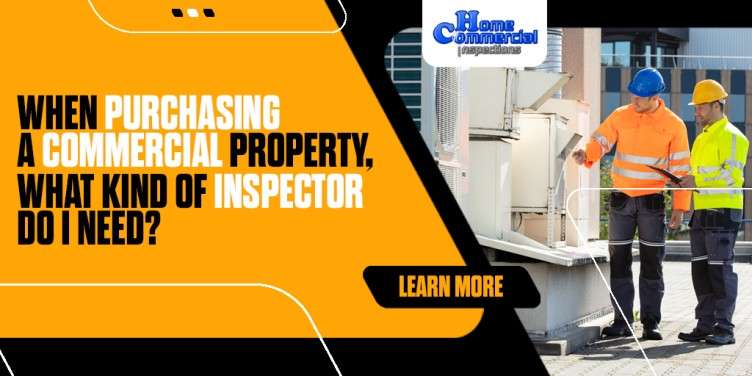
Industry Commitment
February 2, 2023
VA Termite Map Zones
July 18, 2023When Purchasing a Commercial Property, What Kind of Inspector Do I Need?

When Purchasing a Commercial Property, What Kind of Inspector Do I Need?
Purchasing a commercial building is a significant financial investment. Understanding a property’s actual state and the potential associated repair costs can prevent costly mistakes.
Commercial buildings are just different, and their unique features require a targeted approach. A portfolio manager will often order a property condition assessment (PCA) and report (PCR) before purchase since it gives them crucial knowledge about the building’s condition so the buyer can make an informed choice.
Who Conducts a Commercial Building Inspection?
A thorough commercial building inspection will reveal any issues, but who conducts it?
Asset managers and commercial real estate investors have a variety of options when selecting a commercial building inspector. Practical experience plays a big part in evaluating a commercial property’s condition—knowing how things work, how they’re put together, and how they age plays a significant role in identifying deficiencies.
One option is to hire an architect, engineer, or project manager. These people have a range of experience in the building trade, facility management, property maintenance, and related fields. However, engineers and architects may weigh heavily on design concepts because of their expertise and specialized knowledge.
Instead, hire a skilled commercial building inspector who has extensive construction knowledge. For example, a former project manager with decades of experience building commercial properties, such as airplane hangars, banks, hospitals, or other large commercial structures, knows how well properties age. Drawing from their extensive hands-on experience, they can readily identify poor installation practices and material defects.
Many inspection companies specialize in home and commercial inspections. But be cautious—an inspection for a business is not the same as for a home. A home inspector may not perform an assessment to the required ASTM standards, and their estimates may be incorrect because they do not have commercial construction experience. Employing a service that specializes in commercial inspections and is aware that commercial properties are a company asset, a cost of doing business, and a source of money is a good option.
The state of Ohio only licenses home inspectors. Much of that Ohio licensure was adopted by the American Society of Home Inspectors standard of practice (ASHI SOP). Commercial inspections are an unlicensed industry based on the American Society for Testing and Materials (ASTM E-2018). So, without knowledge of commercial buildings and how they are constructed, it is very easy to get in over your head.
Why Should You Hire an Experienced Commercial Property Inspector?
A commercial building inspector’s knowledge and skills are primarily used to safeguard the buyer against unpleasant surprises and capital expenditures. Should any need arise, the inspector has a vast network of contacts who may offer specialized inspection services.
Commercial inspections present significantly more risk and specific issues. The structures are substantially bigger and contain more intricate systems and parts. For instance, a homeowner may have to spend $10,000 on replacing an HVAC system that was found to be broken during a home inspection. In commercial real estate, that is nothing compared to the tens or hundreds of thousands of dollars needed to replace an entire system. Errors are completely unacceptable.
Potential environmental problems may require an inspection by a commercial building inspector, depending on the property type. A knowledgeable commercial building inspector has the experience and expertise to identify potential difficulties, advise the buyer, provide cost estimates, and connect them with the appropriate experts to address problems. Examples include the upkeep and removal of underground oil tanks, the cleanup of polluted soil, or the removal of asbestos-containing building materials.
Additionally, commercial building inspections must follow the ASTM Standard E2018-15 process for property condition inspections. Commercial buildings will command higher inspection rates because they are bigger, more valuable, and need more labor. The assessment may take a full day or longer, depending on the size of the structure, and the final report with cost estimates and images may take a few extra days to complete.
The Key Differences between Commercial Building and Home Inspections
Clients for residential home inspections frequently have sentimental ties to the property. The backyard, the garage, or the kitchen won their hearts. They consider their family members’ happiness, living there, and making memories. The appraisals and market comparables are the foundation for the real estate transaction.
Customers for commercial inspections are typically not personally or emotionally invested because they are engaging in a business transaction. Instead, the buyers primarily consider the property’s past and prospects for generating income. Their chief concerns are
- the returns on their investment,
- the lifespan of the roof and potential cost of replacing it,
- the lifespan of process related equipment,
- structural issues, and the lifespan of the mechanicals,
- expenses over $3000 capex.
A commercial assessment primarily focuses on significant systems rather than interior aesthetics. The inspector mostly looks for problems that could arise immediately or are likely to do so in the future. For example, the faded carpet inside the building is much less of a concern for the buyer than the rooftop heating system, which may cost a lot to replace.
Bottom Line
One misunderstanding in the real estate sector is that a home inspector and a commercial property inspector are interchangeable. They are, in fact, two separate breeds with substantial differences.
A skilled commercial building inspector will be an investment and a lifesaver! It is worth the investment, so you are well-advised to hire the best to protect your investment.

